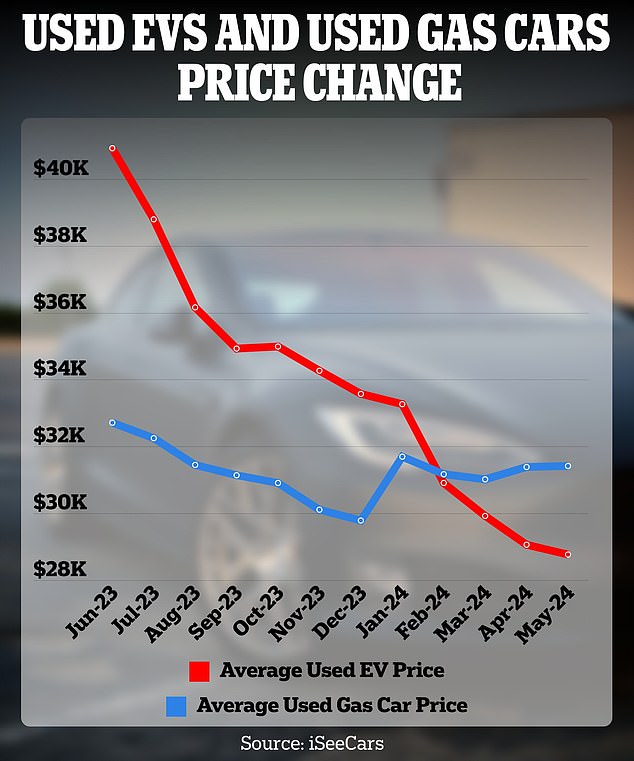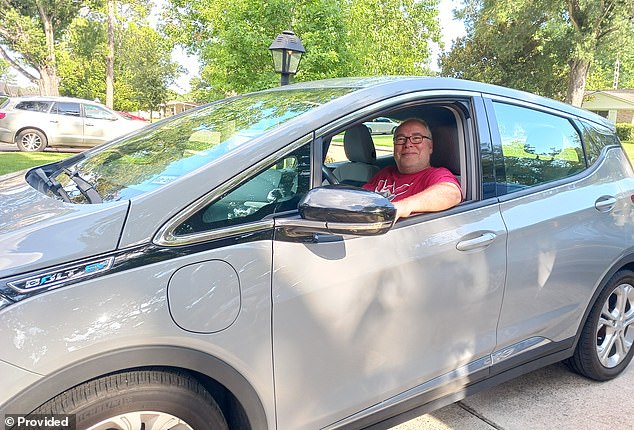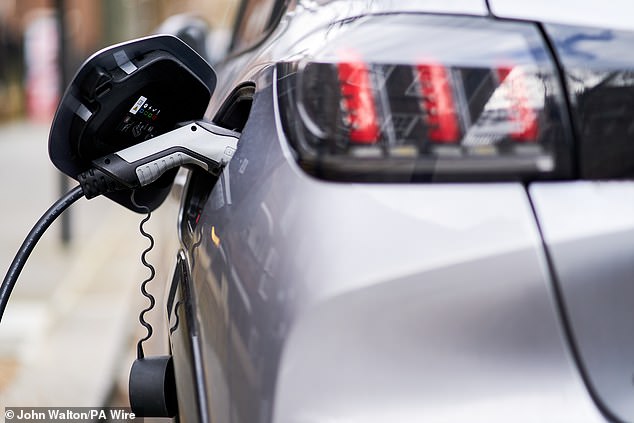Scared to switch from a gas car to an EV? Expert explains five reasons why you are wrong
There are many reasons why Americans are concerned about switching from a traditional gas-powered car to an electric car.
They may be concerned about the price of the electric car or how expensive it is to drive – or they may imagine the car’s battery running out without a charging point nearby.
But how many of these fears are justified?
The adoption of electric cars in the US is declining, with many Americans opting for a hybrid car instead of a fully electric car.
But according to expert Nathan Wyeth, there are many myths surrounding electric cars that need to be debunked.
There are many reasons why Americans are concerned about switching from a traditional gasoline car to an electric car. But how many are justified?
Myth: You need to install a home charging station
According to Wyeth, the US co-lead for EVs at Octopus Energy, there are only two things you need to own an electric car.
The first is having a space, a garage or a driveway where you can park overnight near an electrical outlet, and the second is having a source of electricity in your home.
“If you travel regularly, you should be able to do all your driving by just plugging it into a regular power outlet,” he told DailyMail.com.
“It is a misconception that you absolutely have to pay to have a charger installed in your home.”
Octopus is an energy supplier from Texas. Wyeth therefore uses the example of an “average Houston resident” driving through the city to work as a benchmark for a typical commute.
“You might as well think about the average New Yorker, or the average Seattleite, or the typical person living in Miami,” he said.
Only people who drive longer distances should consider installing a charging station at their home. That typically costs about $1,500, he added.
Myth: Electric cars are unreliable
The American Automobile Association reported last year that, percentage-wise, EVs actually have fewer roadside assistance calls than gasoline cars, Wyeth said.
One of the main reasons for this is that gasoline cars have about 2,000 moving parts, while electric cars have only about 20 in the drivetrain.
“There’s just less stuff that can break,” he said. “You can expect electric motors to have a very long, reliable life.”
Myth: EVs are much more expensive to purchase than gasoline cars
“More and more models are being introduced that are gradually lowering the price of a new electric car so that it is actually quite close to the average cost of a new car in the US,” Wyeth said.

Nathan Wyeth, the US co-leader for electric vehicles at Octopus Energy, said there are many myths surrounding electric cars that need to be debunked
But when it comes to used cars, drivers are able to find the best deals when switching to an electric car.
New data released this month shows that second-hand electric cars are now cheaper than their petrol counterparts for the first time – and the gap is rapidly widening.
a study from comparison site iSeeCars found that the cost of an average used EV was $265 less than an average gasoline car in February.
This marked the start of the trend – and the price gap has grown to $2,657 according to the latest data from May.
“More Americans are looking at used cars to find the right price,” Wyeth says.
“There have been enough models on the market long enough that you can find great electric cars with a range of more than 250 miles available for less than $30,000 or even less than $20,000.”
Americans can also save dramatically on gas if they make the switch. You can go from $100 a month for gas to about $25 a month for electricity, Wyeth said.
“I think it is underestimated that electricity as a product is also more stable,” he added.

The price difference between used electric cars and petrol cars is increasing
Myth: Electric car batteries deteriorate quickly
Wyeth stressed that electric car batteries last much longer than the manufacturer’s warranty, which is typically eight years and 100,000 miles.
Even if you look back five or ten years, batteries still last about 200,000 miles.
‘Especially when it comes to a second-hand electric car, people might think it’s a risky proposition. But I think you have both good warranties and a growing track record that these cars are reliable.
‘They last a long time and you may find that after a long time they surprise you with the quality of the ride.’

Paul Hartweck of Houston has saved $400 on gas in five months with his electric car

According to Wyeth, electric car batteries last much longer than the manufacturer’s warranty
Myth: Now is not the time to buy an electric car
Some people are wondering whether now is a good time to switch to an electric car, as current models will quickly become obsolete, Wyeth said.
“We believe we’ve now reached a point where the cars that are available today have reached a threshold where they will retain their value for a long time.”
If you have a car with a 250-mile range and you drive in the city, you’ll be fine, he said. You can drive for days without having to charge.
But if you’re taking a longer trip, you may need to find charging stations. And there’s undoubtedly still a lot of work to be done on the charging infrastructure in the U.S.
The fear of a lack of stations is one of the main concerns for prospective EV owners, especially in more rural or remote areas.
“The analogy I use is with cell phones,” Wyeth said. “If you think about 20 years ago, they might have worked in the city, but once you got outside of the city, it was harder to get service.
“The telephones became even more useful as cell service expanded. And I think similarly, a car with a 400 km range could become more useful in the coming years as more and more charging stations are built.
“This is a technology that could work great for many Americans today, and for even more Americans in the future.”
